#inaccurate history quotes
Text
Athena: Alcohol is not going to solve your problems
Dionysus:
Dionysus: I’m sorry, but did I not ascend into a true god after I brought wine up this stupid mountain?
#Dionysus#Greek mythology#Greek myth#Greek myths#incorrect greek mythology quotes#inaccurate history quotes#greek mythology inaccurate quotes#Zeus#Hera#Poseidon#hades#Demeter#Persephone#hestia#Athena#Hermes#Apollo#ares#Hephaestus#Artemis#Aphrodite#eris
801 notes
·
View notes
Text
Every day I wake up one step closer to snapping and just making my own Drizzt wiki because every publicly available source is inaccurate and dogshit
#my controversial opinion is that i think personality sections are utterly pointless unless you're actually citing and quoting things#and even then you're bringing reader interpretation into it too#history! timelines! citations for appearances! links to other relevant pages!#gnaws angrily on frwiki#I'm still gonna make that pocketbook though#theres so much inaccurate information out there its hellish
16 notes
·
View notes
Text
"Ed Iskandar talked with God. Then it was Lucifer’s turn. Now he was addressing Adam and Eve.
[...]
Right now, Iskandar was rehearsing the plays from Act I, including Madeleine George’s 10-minute piece about the Fall of Man, which she gives the elaborate title, “A Worm Walks Into A Garden or The Fall of Man, an experiment in motive and comedy.” In it, Lucifer tells dumb jokes to Adam and Eve, as a way of seducing them. Adam finds them funny. Eve doesn’t.
“You’re missing a crucial part of your anatomy,” Lucifer says to Eve. “The funnybone.”
Lucifer is being played by Asia Kate Dillon.
[...]
Dillon was writhing and entwining themself around Eve. Suddenly Chase Brock, the show’s choreographer, got down on the floor and started to writhe on the floor along with Lucifer. Brock had researched the earthworm, and showed some pictures of earthworms to Dillon on his laptop to suggest other moves they could make."
"50 different plays by almost as many different playwrights is a massive undertaking in which each vignette varies in tone from the one before it. The actors playing the characters do not change from play to play; this forces the performers to be as comfortable and convincing with farce as they are playing tragedy. It is also fascinating to contemplate the mental and emotional gymnastics that each performer of The Bats (the resident acting company of The Flea) must have undergone to ensure that each character maintains the same internal psychological throughline when they appear in different plays by very different authors.
The first act deals with the Old Testament books and the Nativity. In playwright Dale Orlandersmith’s Song of the Trimorph, the angels in Heaven mindlessly worship God (a deliciously petty, yet shrewdly authoritative Matthew Jeffers), who takes it as His due until Lucifer (Asia Kate Dillon) starts to question whether love without choice means anything.
Dillon’s beautifully delicate, white-haired devil is one of the show’s most complex figures. Watching them evolve from nuanced philosopher to diabolical heavy to world-weary cynic, depending on the vignette, is fascinating. The narrative speeds its way through the Bible. Highlights include Madeleine George’s surprisingly feminist take on the Adam and Eve story; Hwang’s marvelously urgent Cain and Abel tale, which posits the first murder as a story of vengeance against a capricious God; and Mallery Avidon’s whimsically horrifying tale of Noah’s Flood, which also entails the deaths of everyone who didn’t make it aboard the Ark.
[...]
The show’s second section deals with the Life of Jesus, with Colin Waitt’s astonishingly variegated boy-next-door Jesus shifting from an idealistic dreamer as he travels with Mary and Joseph to a forceful, almost angry philosopher when he argues with Lucifer about the nature of love to a bratty dolt when he confronts Gabriel about his inevitable fate. The fact that the playwrights clearly have a different idea of Jesus’s personality sets Wiatt a complex task: He has to make his Christ the same in all situations; whether he’s being comic or tragic, Wiatt is convincing and moving in a performance of stunning versatility.
Indeed, his likable turns in Gabriel Jason Dean’s beautiful Christ Enters Jerusalem makes his ferocious agonies in Qui Nguyen’s Christ Before Herod and his subsequent crucifixion all the more heartrending. The third act deals with Christ’s resurrection and humanity’s fate at the Day of Judgment, and includes a series of plays set in modern times, as well as God’s final words to Lucifer, Jesus, and to us. The show’s final Day of Judgment coda by Jose Rivera is an essay of forgiveness and unexpected love."
"Overall, the point of view of The Mysteries leans toward deism, the Enlightenment philosophy that presents God as a kind of clockmaker who created the universe, then left it alone to run according to its own laws. We see God squabbling with, then abandoning, Lucifer, setting in motion the events of the Bible, but even in Eden he is surprisingly enigmatic.
[...]
And, as one of the thieves killed with Jesus prophesies, it may all be for naught; he conjures up a future in which "the religion founded -- haha --upon your existence will be held up to justify the slaughter of millions over hundreds and thousands of years, for the brutal sins of domination and exploitation, the lynchings, the massacres and genocide, the relentless militarism. Everything you stood for will be erased."
[...]
In any case, the company is an almost constant joy. Among the more striking performances, [...] Asia Kate Dillon is a compelling presence as Lucifer."
"Four dozen playwrights take four dozen spiritual positions, which allows bubbles of radical reimagining to emerge only to sink again beneath the waves. For instance, our very first playwright, Dael Orlandersmith, paints Lucifer (Asia Kate Dillon) as a sweetheart Cordelia type refusing to curry favor with an insecure God (Matthew Jeffers). The fallen Light bringer keeps popping up throughout, and yet while Lucifer makes a number of solid points—many vigorously antichurch—they're still costumed as a blood-smeared reptile. Does evil exist? Or does it only exist when it can dress super cool?"
"It begins with a scene in heaven where we meet the lavish Angel Chorus that will be with us for the duration of the play, and witness Lucifer’s expulsion from heaven, something like in Milton’s Paradise Lost.
[...]
We also meet the rebellious Lucifer in that first scene in heaven, played with dazzling cynicism by Asia Kate Dillon, and at the same time the angel Gabriel, played by Alice Allemano, who, obedient to God, in contrast to Lucifer, struggles valiantly trying to make sense out of God’s commands and following through on them. These two, Lucifer and Gabriel, played by tall, striking people, fine actors who resemble one another, hold the vast array together like bookends.
The scenes in the Garden of Eden are delightful, played, appropriately in the nude, by Jaspal Binning as Adam and Alesandra Nahodil as Eve. Throughout the play, Biblical episodes are interpreted by the many playwrights in non-canonical ways and the first of these is brilliant: the knowledge the first couple gain through their disobedient eating of the apple is — how to tell a good joke and how to enjoy one!"
"Act I – The Fall begins with Creation and Lucifer’s fall from grace with God. Lucifer is played by a steady, radiant Asia Kate Dillon who reappears frequently to mix things up with earthlings and the rival angel, Gabriel, played by Alice Allemano makes goodness alluring. God is played by an extremely patient and multi-dimensional Matthew Jeffers whose sense of humor humanizes the Lord."
"As starting points, Dael Orlandersmith’s “Song of the Trimorph (Lucifer’s Lament)” and Liz Duffy Adams’s “Falling for You” are somewhat too abstract, particularly “Falling for You,” which has Lucifer wonder, “How can there be love in the absence of being?”"
"Starting with the Fall, we are introduced to the Angel Gabriel and the fallen angel Lucifer, played by two equally lissome and brilliant young actors, Alice Allemano and Asia Kate Dillon. They compete for God’s affections by using a chorus of singing punk angels."
"Asia Dillon as Lucifer brought the precise mixture of demonic delight and fragility necessary for such an adaptation: watching their performance was like looking at a raw cut in the bowels of the earth, brimming with fire and unimaginable sadness."
(no relevant quotes, but throwing in a brief pdf of a grantee project report that focuses on Engagement)
#edited out inaccurate misgenderings in favor of ''not tiresome'' over ''the Historical letter accuracy of the sources''#which are all right there to peruse as originally written too; so#lucifer isn't evil??? 0 stars. long play too long. ''not that enthused'' reviews are always Worse Quality for limiting the info & taking up#plenty of space with [what info Is given is dedicated to supposedly bolstering some specific ''didn't like that'' view of the author's]#just the kind of stuff that'd annoy me as i hate read movie reviews for things i didn't see in the newspaper at like age 12 metacritically#and that of course [just one person] as the norm whether for ''formal'' reviews or not; liking it or not....not the ideal format.#the emergent info or reflections on the same elements / effects of the material that comes from Various writeups by ppl? mwah.#and of course many include fun little Details / noting something that others don't. it comes with lore#the mysteries#asia kate dillon#lucifer the mysteries#lucifer mysteries#gospel48#unfortunately 2/3rds of the quoted articles on chase brock's page for the mysteries aren't online. cmon....#i feel like there might be one article i found the other night that didn't crop up in this search....might be conflating tweets or smthing#can just update it if so anyways....also again No Idea what the longer brown hair vs shorter ''white'' / blond hair is about lol#it kept being extended & that article i think was written in later months; maybe they cut it partway through#more plausible anyways than that they grew their hair out that hard in just a few months. that they also had during rehearsals. shrug#yeah just revisited my History and no other articles that i found last night (morning); none relevant re: akd lucifer mentions anyways lol#also that that was dialogue akd was delivering as lucifer during the crucifixion...was it given to someone else? is lucifer (probably)#taking the place of one of the fellow crucifees & delivering it; and the author focused on who they're standing in for?
5 notes
·
View notes
Text
At times in the writing of wine history, wine itself has been treated as a historical actor. This is the case in many of the sweeping histories of wine, such as Hugh Johnson’s original Vintage: The Story of Wine, Paul Lukacs’s recent Inventing Wine, John Varriano’s Wine: A Cultural History, or Marc Millon’s Wine: A Global History. These lucid and entertaining histories, written by great narrators with serious wine expertise, follow a similar narrative arc. Wine is the central protagonist, the potable Zelig, popping up in different historical moments in different parts of the world. The story begins in the Fertile Crescent, where Wine is born, or in the ancient Mediterranean, where Wine enters a boisterous adolescence in the symposia and bacchanalia of the ancient Greeks. The reader is invited to pause and appreciate the wine-themed mosaic and shards of amphorae. The story then skips a few centuries and a few hundred miles, to medieval Europe (we are left to wonder what Wine has done in between), where Wine joins forces with powerful and institutionalized Christianity and canny monks create a patchwork of orderly clos on the Côte d’Or: bless them! Wine remains in France, or perhaps summers in Germany, and Bordeaux emerges in the seventeenth century, eventually finding its way to Britain (we are treated to a Samuel Johnson quote, or Pepys). Port and sherry have their seafaring adventures. The nineteenth century opens with Champagne surviving war, producing widows and conquering Russian markets; France produces Pasteur, who produces better wine, a triumph of science and the Enlightenment; wine is enjoying its golden years. Then, three-quarters of the way through this drama, tragedy strikes, in the form of the vine disease phylloxera. Wine is dealt a staggering blow and its very survival is threatened. Fortunately, a new world of scientists, mavericks, and neoliberal entrepreneurs emerge: capital is found, the plucky New World steps in to help, and new vines are grafted. Wine is saved! This cannot be criticized as being a Eurocentric narrative, because the tale concludes in California, or Uruguay, or China. Undeniably, at the conclusion of this story there is incredible momentum and optimism. Global wine production is the highest it has ever been, consumption of wine is high, and wine is (relatively) cheap. Were he a wine historian, Francis Fukuyama would declare it the end of wine history.
This hagiography of Wine is a great read: a mouth-watering tale of high drama, blind monks, and supple tannins. And it is not necessarily inaccurate. But it is, on the other hand, what British historians have called a Whiggish narrative: one that presumes continual progress, culminating in the current era, which is assumed to be the best ever. This Whiggishness may overlook some of the current difficulties in the market, or shrug off past problems in the wine industry, since all ended well. Geographically and chronologically it is uneven, such that the producers studied here generally do not merit inclusion until they have become major global actors. This type of narrative structure is what gives the false impression that South Africa produced a great wine called Constantia in the eighteenth century, and then produced nothing again until 1994. The place of Wine as the embattled protagonist who overcomes many hardships (vine diseases, consumer apathy, high taxation) and emerges triumphant and affordable in the late twentieth century, is also what is known in Marxist terms as “commodity fetishism.” As Bruce Robbins has argued, in the new commodity histories, “each commodity takes its turn as the star of capitalism.” The commodity itself, rather than the social and economic relationships that led to its production, becomes the driving force of the narrative.
Jennifer Regan-Lefebvre, Imperial Wine: How the Empire Made Wine's New World
45 notes
·
View notes
Text
PSA on single-character Chinese names
The usage of single-character names BY THEMSELVES is considered a little odd in modern Mandarin. Multi-character names are fine, for example, Wangji is fine by itself, but if you’re referring to him by birth name, you wouldn’t usually refer to him as JUST Zhan. You will have to use his full name (Lan Zhan), or add a prefix or suffix to the name, like A-Zhan, or Zhan’er. Unfortunately, the Netflix subs of CQL tends to omit the prefixes / suffixes from the names, thus translating A-Ying, for example, as simply Ying. This is an inaccurate translation.
There ARE occasions when single-character names may be used by themselves. For example, when JFM is referring to WWX early in CQL while talking to LQR, he calls him “Ying” and in LWJ’s letter to WWX, inviting him to JL’s hundred day celebration, he also refers to him as just “Ying” near the end of the letter (see below). However, this is somewhat formal dated usage, and is no longer common in modern Mandarin. I believe this is part of a larger evolution of Chinese language away from a more single-character focused lexicon, which I will explain below.

THE EVOLUTION OF CLASSICAL TO MODERN CHINESE
The modern spoken form of Mandarin evolved from an olden form of written Chinese, which I’m going to refer to as classical Chinese for simplicity’s sake (I believe historians actually have different names for different eras of ancient written Chinese). At the same time though, modern Mandarin is VERY different from classical Chinese. Classical Chinese is pretty much like... an entirely different language from modern Mandarin. I’m going to quote this meta which I encourage you guys to read in full for an analysis on LWJ’s speaking style:
文言文 wenyanwen / classical/literary Chinese is related to but distinct from modern Mandarin… Modern Mandarin Chinese as we know and learn it today in classrooms is something that didn’t really get codified until the 20th century… classical Chinese can be summed up, like most things in Chinese, with a four-character idiom: 言简意赅 yanjianyigai. Broken down, we get:
言 yan - words, speech
简 jian - simple, brief
意 yi - meaning, intent
赅 gai - complete, full, comprehensive
Classical Chinese (which is heavily focused on single-character root words, thus condensing a lot of meaning into a relatively short sentence) was largely a written form of Chinese used by elites. Historians do not seem to believe that people spoke classical Chinese, but a vernacular form of Chinese which we don’t have record of. Typically though, languages tend to become increasingly diverse over large swaths of land, which leads to the emergence of dialects native to different regions. As a result, people from different regions may not actually understand each other.
However, China was united as a kingdom over vast swaths of land for many periods in dynastical history. It had a political system where magistrates stationed in even the faraway reaches of the kingdom reported to the emperor and his cabinet of ministers in the capital. As such, if you wanted to be a magistrate, you would have to learn this written form of Chinese, and take the imperial exam to be selected for the position. As a magistrate, you would be expected to correspond with officials from other regions in this written form of Chinese. This written form was thus able to bridge the differences in spoken Chinese.
But according to my Chinese teachers!!! (Disclaimer: they are high school language teachers, not Chinese history professors, so I cannot completely guarantee the historical accuracy of these claims,) When modernization happened, transportation became more advanced and urbanization became more and more of a thing. Thus, society saw a greater intermingling of people from different regions who couldn’t necessarily understand each other in spoken Chinese. This necessitated the emergence of a new common spoken tongue. Modern Mandarin, which is often referred to as putong hua (lit. common language), was thus born.
THE MOVE FROM SINGLE TO MULTI-CHARACTER WORDS
According to my Chinese teachers (see previous disclaimer again), modern Mandarin basically moved away from the single-character focused lexicon of classical Chinese, towards increased usage of multi-character words. For example, the modern word for “conflict” 战争 is made of root words 战 and 争 both of which rooooughly mean “conflict” as well. In a classical lexicon, the root words would likely be used by themselves, but modern Chinese mostly uses multi-character words.
And this, according to my Chinese teachers, was to improve the understandability of spoken Chinese. Chinese language has a GREAT NUMBER of homophones, which can get REALLY FUCKING CONFUSING. The Zhan (战) in “conflict” sounds exactly the same as 站 (to stand) 占 (to occupy) 湛 (as in Lan Zhan), and more. As such, while the root words 战 and 争 may carry the intended meaning perfectly well in writing, in speech, they individually sound like a bazillion other words. Which thus necessitates these multi-character words. 战 may have many homophones, but 战争 has a great deal less homophones.
So why do we generally not do single-character names in speech anymore? BECAUSE IT CAN GET REALLY FUCKING CONFUSING. Like if you wanted to say something as simple and functional as “go to Zhan” (去湛那边), the Zhan of his name (湛) is a perfect homophone for 站 (to stand), so it literally just sounds like “go stand there” 😭😭😭 At least if you use his surname (Lan Zhan), a prefix (A-Zhan), or a suffix (Zhan’er) it becomes a whole lot clearer that you’re referring to a person.
THE TLDR;
This is a very long and roundabout way to say: please don’t replicate the Netflix subs in your fics. If you’re referring to someone with a single-character name, add a prefix or suffix to the name, like A-Cheng, or Cheng’er, or else use the full name, Jiang Cheng. Multi-character names are generally fine, for example, Wanyin, Wangji, or Xichen are all fine. Wuxian seems to be a little bit of a grey area. It does not seem to be used by characters in the novel, probably because it sounds like 无线 (wireless), which is the reason why the Chinese fandom likes to refer to him as “WiFi” 🤣
476 notes
·
View notes
Text
Just watched philosophy tube's video on antisemitism. Abigail is known for doing her due diligence and really giving her all to do proper research, at the beginning of the video she even mentions how grateful she is for the jewish script consultants who helped her with the episode. I was thinking this is what I need rn, an ally putting effort.
In minute 21 she mentions the only reason jews came to Palestine in the early 1900 was because of the "British mandate which started in 1917" (as far as I'm aware it started in 1920), which "supported the zionist project at least in part bc they wanted to get rid of the people in Britain". She then makes it seem like the only reason the mandate ended in 1948 was because of the Arab revolt (its the only reason mentioned). She continues to say at this point in time the Palestinian people basically asked the UN for their land back to which they responded "that's Israel now". This section doesn't have any sources appearing on the screen while she speaks. Her following quote is "its a wonder I'm not invited to teach more history classes" which. Sorry but its not a wonder to me....
I don't blame Abigail, I still like her as a creator and I will continue to watch her videos and support her. I also understand that not all Jewish people will view this as poorly as I have, and the proof is that none of the Jewish script consultants she hired seemed to have said anything (I assume) bc she kept it in.
But I actually mind a lot to see she choose to present a narrative in which the Jewish people are once again passive in the events which came to. My great grandparents in Germany (in early 1900s) did no go to a Jewish youth program which encouraged their participants to support the Jewish yishuv and believed in the right to return to their land (way before the mandate btw) for gentiles to think the only reason we came back is cause it was in Britain's interest. These specific people believed that land is and will always be their holy land.
Also according to https://en.m.wikipedia.org/wiki/Mandatory_Palestine:
Competing interests of the two populations led to the 1936–1939 Arab revolt in Palestine and the 1944–1948 Jewish insurgency in Mandatory Palestine.
Why omit one?
Additionally, from the same source, one sentence after:
The United Nations Partition Plan for Palestine to divide the territory into two states, one Arab and one Jewish, was passed in November 1947.
So I would say it's inaccurate, to say the least, to present it as the Palestinian people asking the UN for their land back to which the UN said no? That is just. Not what happened at all. And the first and very basic most research (Wikipedia) presents why this is false.
I'm really bothered by how this whole sectioned just went up with no sources. Did no one mind? Sigh.
It's just a very specific part of the video. But you know what? I'm just a little tired...
41 notes
·
View notes
Note
it just seems strange how many people are being weird *to you* about abby cox’s video… when it’s (imo) quite a lovely video. as an afab nonbinary person, i’m so so interested in her discussion of how people like me would have realistically navigated the past, and it’s not like she doesn’t acknowledge them! it’s just that the options were more limited than a lot of media presents them, but that’s what history IS and it’s not insensitive to discuss how real people lived realistic lives.
also you always get SO many asks when a topic like this comes up, it’s as though you’re the historical costuming rep for tumblr and people want you to defend them for perceived slights
I think it was just one person who sent several anons over the course of the day, in response to another person who asked why I didn't like L*ttle W*men 2019. I mentioned not liking that they put Jo in menswear from the waist up when they claimed historical authenticity and that choice- while not something that could never have happened; GNC women did exist, and like Abby Cox, I never claimed they didn't -doesn't make sense in the specific contexts in which they applied it.
But yeah, the vitriol over that video never made sense to me. Everyone seems to firmly believe that she basically said "screw masc-presenting women" and that's just. Not what it is at all? There's an entire section of the video about women who DID wear conventionally masculine clothing in the 19th century! She praises the costuming in G*ntleman J*ck (censoring for the tags) for threading the needle re: reflecting Anne Lister's masculine presentation but still acknowledging that she had to make concessions to the world she lived in!
(And don't even get me started on the whole Mary Wollstonecraft tizzy. Yes, she was a "quote unquote feminist" because the term "feminist" didn't exist yet and has connotations today that would be inaccurate to apply to her. Current scholarship usually calls her a "proto-feminist" or finds a more cumbersome but precise way to describe her views. Yes, she did say "cringey" things about women and fashion- namely, that the only reason women showed an interest in dress was that their Minds Were Caged By The PatriarchyTM. She was human. She was fallible. Why is that a sin to say?)
I don't know. I'm happy to offer my opinion on such things any day, but you're right- that particular Anon certainly was determined to Win the discussion, and waxed more than tiresome by the end.
78 notes
·
View notes
Text
Unsupervised: a Band of Exiles drabble
Inspired by and dedicated to the incredible @velidewrites and THIS hilarious Inaccurate ACOTAR quote. Enjoy!
Elain looked up at the clock again, huffing to herself as she stuck the chunks of marinated meat on the skewers. It was already 4, she had sent Lucien and Jurian off for supplies hours ago, and sunset was rapidly approaching. If they didn’t get here soon, all of her plans for Vassa’s birthday would be ruined, and Elain needed it to be perfect. She had been planning it for months, pouring over volumes of Scythian history and culture, pestering her friend to tell her stories of the home she missed so much. They would cook skewered meats and vegetables over an open fire and sleep in a large tent under the stars, and while it wasn’t quite as Scythian as Elain would have liked, she could at the very least make Vassa happy with the effort. She didn’t have fermented mare’s milk, but sweet wine would work, though she did manage to get the spices needed for the food. Now, all that was left was the tent. It wouldn’t be the large dome that the nomads used on the plains, but they could fake it, Elain had decided. She had sent the boys off for canvas and posts in the early afternoon and there was still no sign of them.
Suddenly, Elain’s thoughts were interrupted by chaos, Lucien yelped as Jurian shouted “DON’T BITE ME” as she ran out the back door. Making a beeline for the yard, she stopped dead in her tracks as she found herself face to face with a very fat miniature horse.
Blinking, Elain looked up at Lucien as he grinned awkwardly, “Lucien what is this?” she demanded
“His name is Barnabas,” Lucien said weakly
“You were supposed to get supplies for the tent-” Elain sputtered as Barnabas looked at her with cold, dead eyes.
“I did, and we even got it from a Scythian merchant” he said pointing at the sad pile of canvas, “and luckily Barney here came at a discount. Now we can have a full Scythian experience.” Lucien leapt to the side as the demonic horse took a snap at him. “If we’re lucky, Vassa can ride him in her bird form.”
Elain, with fury creeping in her chest, met her mate's eyes. She had to remind herself, in that moment, just how much she loved him before she strangled him. “I sent you off hours ago for one simple task and you came back with this?” she hissed.
“In my defense, I was left unsupervised.” Lucien replied smoothly.
“Wasn’t Jurian supposed to go with you?”
“In my defense, I was also left unsupervised.” Jurian said as his hand hovered over Barnabas’s fat backside.
“I’m going to kill you both”, Elain said numbly as the little horse began to nuzzle her body, “You two are like children.”
117 notes
·
View notes
Text
Intro Post!💀🦇🕸🕯
Hey there! Figured I'd finally make one of these in case anyone who stumbles on this blog wonders what it's all about.
As it says in my blog description, this is an online space where I can compile and organize imagery, info, and anything else that inspires me related to the novel I'm developing. At least that was the original motivation for making this, but I'm definitely wanting to post some original content surrounding the story and the characters in it soon! This imaginary world has been obsessing me for a few years now, and I'm honestly chomping at the bit to share it with others.
What you'll see on here:
Images related to: gothic lit, the regency period in Europe/Britain, the late 16th/early 17th century, some earlier 18th century, ancient and prehistoric cultures, paganism, the occult, witchcraft, fairies, folklore, the countryside/forests, autumn, Halloween, demons/devils, romantic fashion, screenshots and gifs from films, illustrations/other artists' art that inspires me, and any other random pic that speaks to me or that gives me an idea even vaguely related to the story.
Text posts relating to: all the same subjects above, plus quotes from poetry and literature, other stories that inspire me, and writing advice posts/memes.
Hopefully soon: posts introducing my characters and sharing concept art, ideas, research I've done, who knows what else??
***Content warning for some imagery that may be disturbing (as can be expected, I guess, from a horror aesthetic/theme).***
What the novel's about:
It's [going to be] a gothic/dark fantasy/folk horror/historical fiction novel set in regency Britain and centering around the concept of Halloween and its origins/meaning. Think Jonathan Strange & Mr. Norrell meets Over the Garden Wall. Kinda. Characters include a bratty aspiring sorcerer, a demonic changeling who wants to be human, a witch, a sin eater, and a handsome devil. Over the course of the plot the question of whether the spirit realm(s) and mortal world should be kept separate will be a source of conflict.
I've had some aspects of this story/characters in my head since I was 14, so it's super special to me!
About me:
I'm an artist, writer, and musician. This is my first time trying to write anything as involved as a novel. I'm having loads of fun with it, though. I love music and reading and history, particularly fashion history, and anything related to the supernatural. The title of my blog is a reference to a song by Echo & the Bunnymen (though I think it's actually an inaccurate lyric :P ).
Ficton books I've been reading lately: Jonathan Strange & Mr. Norrell by Susanna Clarke, The Shadow of the Wind by Carlos Ruiz Zafón, Anne Rice's Vampire Chronicles books, Edgar Allan Poe short stories
Nonfiction books I've been reading: The Devil and All His Works by Dennis Wheatley, Celtic Mythology by Philip Freeman, The Making of Victorian Values by Ben Wilson, Occult Features of Anarchism by Erica Lagalisse, Halloween by Lesley Pratt Bannatyne
Some musical artists I'm into recently: Cranes, Kate Bush, The The, The Smiths, Fiona Apple, Alex G, Caroline Polachek, Imogen Heap, Depeche Mode, Fad Gadget, Pinback, Steeleye Span, The Cleaners From Venus, Suzanne Vega, The Garden, Jessica Pratt
Visual Artists I've been thinking about lately: Edward Gorey, Aubrey Beardsley, Nicole Rodrigues, Francisco de Goya, Leonora Carrington, Brian Froud, Wendy Froud, Willam Blake, Edvard Munch, Harry Clarke
Some of my favorite films: The Witch, Valerie and Her Week of Wonders, The Wicker Man (original), Meshes of the Afternoon, Days of Heaven, The Thief and the Cobbler, The Masque of the Red Death
Regardless of why you're here, I sincerely hope you enjoy browsing around, and feel free to say hi! :) I would love to link up with other writers on here and make some new pals. Also feel free to like this post and I'll give you a follow!

#writeblr#writeblr introduction#new writeblr#writblr#writeblr community#divider found on the blogs cold--carnage and sweetparty
14 notes
·
View notes
Text
my odyssey with the shitshow that is legends and lies, the patriots
i'm watching bill o'reilly's show legends and lies, the patriots and it is wild. 💀 for a show that claims to disperse legends and myths it sure does feed into a lot of narratives. it's actually impressive, how it dramatizes these events and people to the point where every single figure is inaccurate and somehow less entertaining than their actual selves. didn't get to every episode because not all of them are online.
up to the war it's mostly a lot of dramatization that doesn't really add anything and is still horrendously awkward. but the constitutional convention onwards is where i sat there and went. oh, this is bad.
it's obviously not equipped to handle the jefferson-hamilton rivalry and the resulting political factions because it dilutes both figures so bad lmao.
jefferson is just pouting 24/7. they have the actor say the quote from the letter he sent washington about the dinner bargain where he went " hamilton tricked me sirrr he literally duped me into a compromise" without any context. and when washington later calls him out on his sneaky newspaper bullshit he just sits there sulking. like give the guy some credit, he could scheme! he was a far better politician than hamilton! if you're going to try to break down the mythological image of jefferson as the holy patron of the common man then do it all the way! he wasn't like "but sir :(" and then gracefully concede defeat wtf. they make it seem like jefferson lost to hamilton and then later suddenly won (?) without delving into the attacks on hamilton's reputation and how it was a very effective campaign.
also, there is a lot to explore in jefferson's arguments themselves. it would be worthwhile to delve deeper into why exactly he opposed hamiltonian policies, how he thought it would affect the union, etc. to be fair the show does talk about how he thought hamilton would create a monarchy, which is true - but it's just barebones, you know? maybe a bit more detail to actually strengthen both sides' argument if your goal here is objectivity and truth.
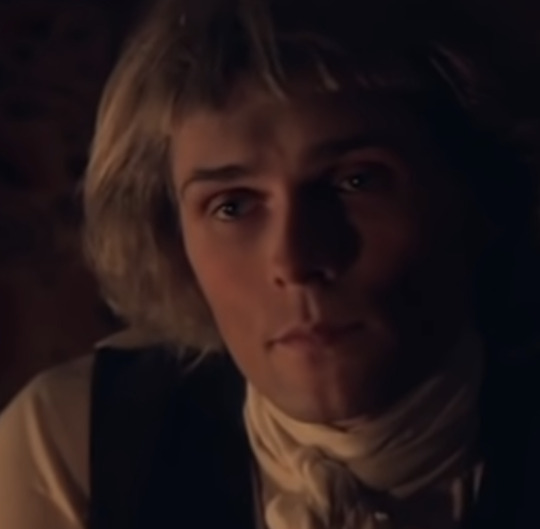

i'm a little lad who wants berries and cream!
and you could probably guess this from what i just said about jefferson but hamilton is exactly the ambition-crazed machiavellian schemer you would expect him to be. what's worse is that they don't go into his actual actions that can be critiqued all that much. like why exactly did he want the whiskey tax? what consequences did it have? there's a lot of complexity to dig into, both in how he reasoned he was taxing a luxury, how the farmers reacted, etc. or how there was speculation (duer) that strengthened jefferson's concerns; none of that's really addressed properly. once again, just barebones. this man did not conceal his thoughts, there's a lot of ammunition and yet.
it's hilarious because from his very first appearance as aide-de-camp they kept doing these sneaky cuts to his face where he's just side-eyeing with this deadpan expression. at the time i was like "wtf is wrong with this editing" but i think they were trying to foreshadow 😭. for the rest of the show he's always sitting in corners, smoking and staring at jefferson/washington.
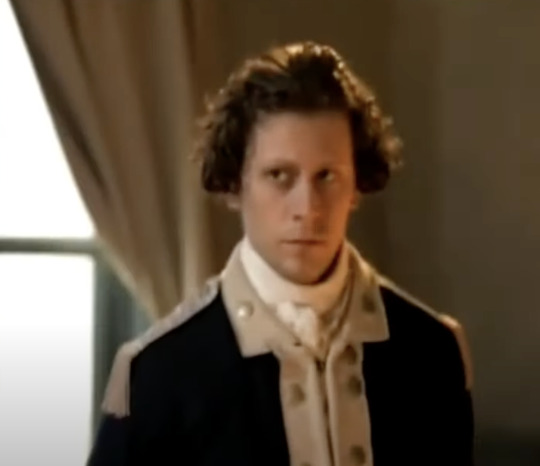
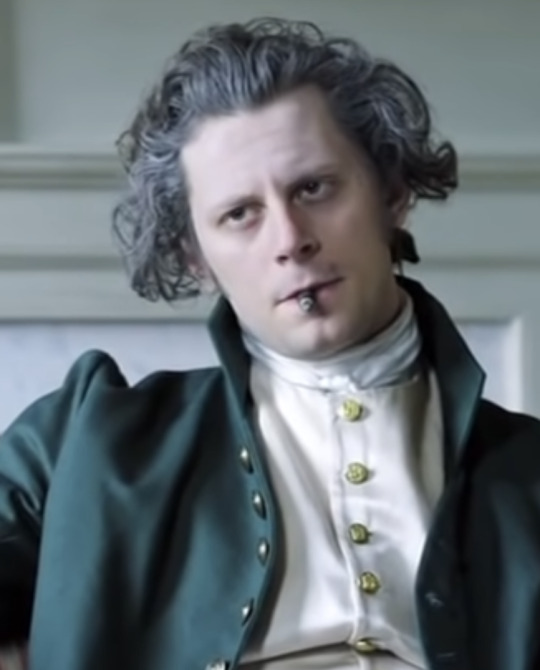
and the quasi-war is so bad. so bad. they address hamilton wanting to use the war as an opportunity to establish a standing army but go about it so heavy-handedly it just becomes wack. in the show, hamilton is so crazed by his jealousy towards adams that he'll do anything to take power (his ambition did have a role in it but it's weird that they don't say anything about what the french were doing at this point, why americans were divided? not even sure if non-history buffs will immediately realize that this war with france is due to the french revolution and la dih dah.) and this what he says after mchenry claims that adams will want washington as general again:
"But His Excellency is far too old to command from the field. He will give his command to a trusted friend. Someone...perhaps...he once thought of as a son. *smirk with McHenry*."
the last part? "someone he once thought of as a son" BITCH if you did any research you would know that hamilton was screaming crying throwing up at the mere THOUGHT of being considered washington's son. you can hear the villain music in the background. no, literally, you can actually hear villain music. i love this show so much.
then it tells us "yeah hamilton took power" but where is washington in all this? the guy who insisted on hamilton being his 2nd apparently out of love for his "son" (lafayette found dead in a ditch). dying in bed according to the next scene lmao.
so yeah hamilton is a shitshow but that also ruins washington because he's in that weird position of being idolized and also diminished. "yesss slay washington you are so talented as a spymaster and spotting talent but also you were manipulated by hamilton! but also you fully supported hamilton's agenda! you were such a good president i love you."
and john adams is so weak it's an insult to the man. at least show us that hater energy. wdym adams went "i had thought you had stopped this obsession of yours" to jefferson when jefferson was complaining about hamilton? maybe he didn't hate hamilton as much at that point if that's what they're implying? but the show makes him into this affable guy, who didn't want an army (the man longed for military glory) and only dismantles it because he realizes that jefferson was 100% right and it was all hamilton's quest for power. the french are nonexistent in this french-american war, which is my biggest grievance.
and aaron burr...the less i say about this show's aaron burr the better. didn't even try for historical accuracy. didn't try for anything besides "mwahahaha i am a politician! with no ideas! and i will say that to your face hamilton" so yeah the hamilton that they portrayed as crazed for power (in the same 40 minute episode i tell you) is suddenly a great judge of character. maybe at the end they did make him slightly sympathetic? it talks about his public fall from grace after the duel so some points for that.
and look at this shit y'all. can't make this up.
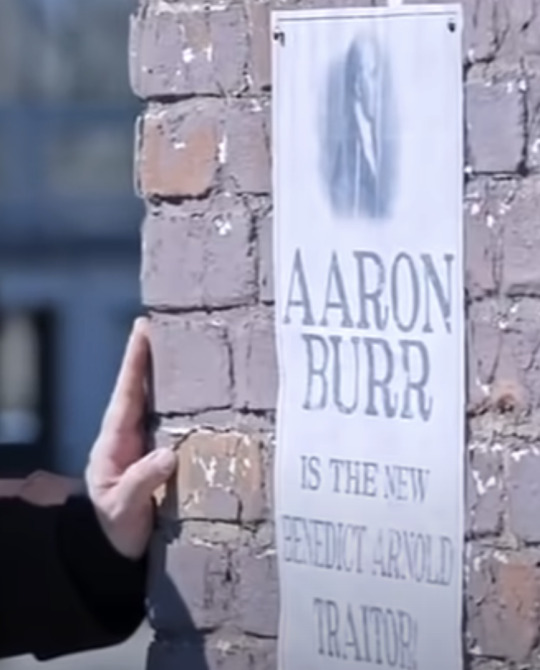
sigh. a historian says "jefferson insisted on seeing hamilton as a power-hungry monarchist" but then the show makes it seem like that's the truth. all the historians are saying things and then the show's scenes are saying something completely different so the entire thing is ???? wtf is the goal of this thing?
besides all of this, it's a wild ride based purely on the absolutely terrible hair. you will not believe how bad the hair is. i shit you not i screamed ten times wondering where the hell they got wigs that can look that bad. watch it just for the hair actually.
and of course the strange, awkward editing and flashbacks that are probably confusing to people who are normal and don't keep historical dates/events marked up with these people's lives. washington dies and comes back to life in flashbacks like 3 times.
it sucks! it's not even entertaining but there are moments of humor and ridiculousness; the bad hair really saved this thing. i might be harsh, given that i just defended hamilton the musical for its relative inaccuracy, but i find it fundamentally different because this show claims superior historical accuracy. it looks and feels like a low-budget documentary and it's just. wrong. at certain points. if it wants to get real into the nitty-gritty of these complex people then you have to commit! it couldn't quite abandon the common impression a lot of americans have towards jefferson, couldn't abandon that perspective of hamilton. but then it doesn't delve into the actual mistakes and darker actions of these people. maybe it was in a different episode but i saw no mention of the reynolds pamphlets, jefferson's relationship with sally hemings, diplomatic deals, or whatnot.
not only is it a ultimate failure at clearing up legends and lies, it probably created some new ones instead. only part that was relatively okay was benedict arnold's i think.
#alexander hamilton#george washington#aaron burr#thomas jefferson#john adams#historical hamilton#amrev#legends and lies#tale of the shitty docu-series#wtf is this thing
13 notes
·
View notes
Text
Hermes: Knock knock
Apollo: Who’s there?
Hermes: Cow goes
Apollo: Cow goes-
Hermes: Mooooooo
Hermes: oove
Apollo:
Hermes:
Apollo: You stole my fucking cows again, didn’t you?
#i came up with this joke drunk#Apollo#Hermes#Did Hermes ever actually give Apollo his cows back?#Greek mythology#Greek myth#Greek myths#incorrect greek mythology quotes#inaccurate history quotes#greek mythology inaccurate quotes#ancient greek#ancient rome#Zeus#Hera#hades#Poseidon#Demeter#hestia#Athena#Dionysus#ares#eris#Artemis#Hephaestus#Aphrodite#greek mythology funny#Greek mythology humor
130 notes
·
View notes
Text
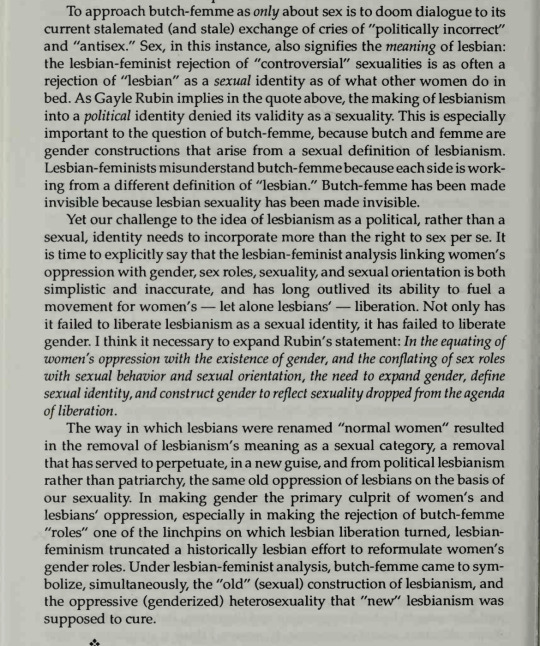
"To approach butch-femme as only about sex is to doom dialogue to it's current stalemated (and stale) exchange of cries of "politically incorrect" and "antisex". Sex, in this instance, also signifies the meaning of lesbian: The lesbian-feminist rejection of controversial sexualities is as often a rejection of "lesbian" as a sexual identity as of what other women do in bed. As Gayle Rubin implies in the quote above, the making of lesbianism into a political identity denied its validity as a sexuality. This is especially important to the question of butch-femme, because butch and femme are gender constructions that arise from a sexual definition of lesbianism. Lesbian-feminists misunderstand butch-femme because each side is working from a different definition of "lesbian". Butch-femme has been made invisible because lesbian sexuality has been made invisible. Yet our challenge to the idea of lesbianism as a political, rather than sexual, identity needs to incorporate more than the right to sex per se. It is time to explicitly say that the lesbian-feminist analysis linking women's oppression with gender, sex roles, sexuality, and sexual orientation is both simplistic and inaccurate, and has long outlived its ability to fuel a movement for women's- let alone lesbians- liberation. Not only has it failed to liberate lesbianism as a sexual identity, it has failed to liberate gender. I think it necessary to expand Rubin's statement: In the equating of women's oppression with the existence of gender, and the conflating of sex roles with sexual behavior and sexual orientation, the need to expand gender, define sexual identity, and construct gender to reflect sexuality dropped from the agenda of liberation.
The way in which lesbians were renamed "normal women" resulted in the removal of lesbianism's meaning as a sexual category, a removal that has served to perpetuate, in a new guise, and from political lesbianism rather than patriarchy, the same old oppression of lesbians on the basis of our sexuality. In making gender the primary culprit of women's and lesbian's oppression, especially in making the rejection of butch-femme "role" one of the linchpins on which lesbian liberation turned, lesbian-feminism truncated a historically lesbian effort to reformulate women's gender roles. Under lesbian-feminist analysis, butch-femme came to symbolize, simultaneously, the "Old" (sexual) construction of lesbianism, and the oppressive (genderized) heterosexuality that "new" lesbianism was supposed to cure."
"Recollecting History, Renaming Lives: Femme Stigma and the feminist seventies and eighties" by Lyndall MacCowan, The Persistent Desire, (edited by Joan Nestle) (1992)
#lesbian#lesbianism#lesbian history#lgbt history#gay history#lgbtq+ history#the persistent desire#butch femme#butch lesbian#femme lesbian#feminism#lesbian feminism#butch#femme#Lyndall MacCowan
58 notes
·
View notes
Text
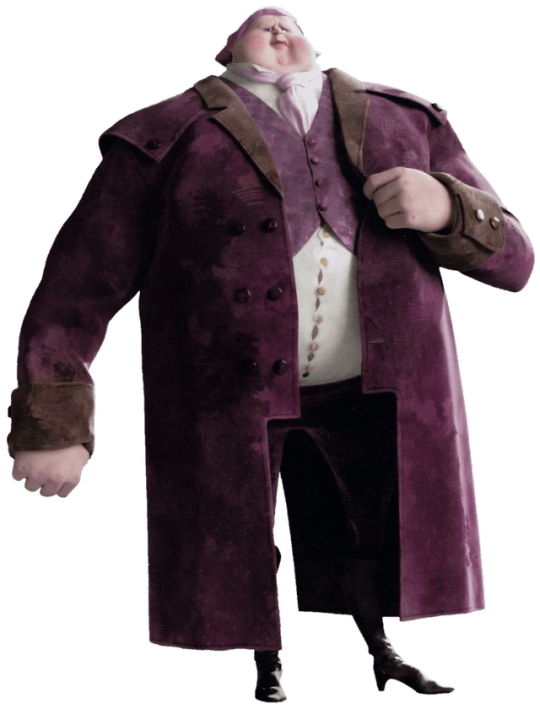

So we're all familiar with the famous Nursery Rhyme involving Jack Horner, the one involving the plum pie?
Well turns out there's actually A LOT more PD content to him than people realize.
Quoting from his Public Domain Superheroes Wiki Entry:
(---"Jack Horner is the protagonist of the Eighteenth Century nursery rhyme “Little Jack Horner” as well as of a subsequent chapbook that portrays him as a sort of heroic prankster who slays a giant and who punishes dishonest people by using his coat of invisibility and his magical bagpipes. (Says the chapbook, “Whene’er he took a ſword in hand, / He made his foes to bleed.”) By the middle of the Nineteenth Century, however, his heroic exploits were mostly forgotten and further appearances usually portray him only as the little boy from the rhyme (although “What Jack Horner Did” and The Luck of Santa Claus do portray him heroically). By far, his strongest association is with pie, which he is eating or holding, or which is at least mentioned, in nearly every appearance.
Jack Horner is a variation of the archetypal stock folk hero Jack, and indeed some of his adventures are apparently derived from those of the character Jack in “The Friar and the Boy” as well as Jack the Giant Killer. Different variations of the Jack archetype are also often portrayed as separate characters; for example, Jack Horner meets and interacts with Jack and Jill, Jack Sprat and Nimble Jack in multiple stories, and he meets Jack Frost in The Luck of Santa Claus.
The popular English‐language nursery rhyme “Little Jack Horner” describes the unusual thing Jack does while eating a plum pie. The most common modern words are:
Little Jack Horner
Sat in the corner,
Eating a Christmas pie;
He put in his thumb,
And pulled out a plum,
And said 'What a good boy am I!'
According to The Pleasant History of Jack Horner, Jack lives near London and is “A pretty boy, a curious wit, / All people ſpoke his praiſe.” His sitting in a corner and pulling plums from a pie is an annual Christmastime tradition of his childhood years. In “The Discouraging Discovery of Little Jack Horner,” it is Jack’s sister who bakes the famous pie, but Jack breaks a tooth on a plum stone accidentally left within it. In The Renowned History of Little Jack Horner, Jack encounters a beggar while on his way to school and sends her to his home so his mother can give her his leftover pie. So impressed is his mother with his charitable nature that she and his sister Patty Horner bake him a fresh new pie. In “There Was a Boy Who Lived on Pudding Lane,” Jack lives in Cole’s kingdom along with other nursery rhyme characters and is one of the children rescued by Santa Claus after being entranced by the villainous Pied Piper. In The Luck of Santa Claus, Jack Horner lives in Mother Goose Land but flies to Santa Claus Land on the back of one of Mother Goose’s wild geese in order to help her and other nursery rhyme characters to deliver presents on Christmas Eve after Santa and his reindeer are injured in a sleighing accident. In The Modern Mother Goose, Jack lives in Gooseland and is one of the children who attend Mistress Mary’s party on the moon. In The Strike Mother Goose Settled, Jack denies ever having pulled a plum from any pie, saying that the nursery rhyme is inaccurate, but it is revealed that the pig stolen by Tom, the Piper’s Son, which had only been taken temporarily as a prank, actually belonged to Jack. Mother Goose’s Melody suggests that Jack may have eventually become apprentice to a minced pie maker.
In “What Jack Horner Did,” Jack is an orphan being raised by his poor grandparents “in an old tumble‐down house at the edge of a big wood.” One day, Jack rescues a man from drowning in a nearby bog; it turns out that the man is quite wealthy and, in gratitude, lavishes gifts and gold coins on Jack and his family. Elated by Jack’s heroism and the resulting good fortune, Grandma Horner is inspired to bake him a plum pie on the day before Christmas.
In Boy Blue and His Friends, a book that gives more realistic origin stories to various nursery rhyme characters by portraying them as average schoolchildren in the United States, Jack Horner’s real name is Jack Horne, and he is the one responsible for inadvertently letting Mary’s lamb Fleecy into school by arriving late and leaving the school door ajar. The “Christmas pie” is actually a fake pie fashioned by his mother for a party at their home, with the “plums” inside being wrapped party favors for the guests. Jack’s plum contains a watch so he would not be late to school again.
In “The Christmas Conspiracy,” Jack Horner and other characters live in a huge book of nursery rhymes in the home of children Harry, Nell, Bobby and Dot where he participates in a lighthearted plot on Christmas Eve to “capture” and confront Santa Claus to ask why he doesn’t bring gifts to nursery rhyme children. So confident is Jack that he will get the pie that he wants for Christmas that he gives his old pie to Simple Simon, saying “I picked out all the plums years ago.” Jack indeed receives a new pie from Santa, which is visible thereafter in the book in which he lives. It is also implied that Mother Goose is genuinely Jack’s mother.
In The New Woman in Mother Goose Land, Jack Horner is the brother of Tom, the Piper’s son, and by inference, is also himself the Piper’s son (and the Piper is Mr. Horner). Mrs. Horner is a busy suffragette who henpecks her husband and leaves Jack to care for his little sister, Rockaby Baby.
In The Pleasant History of Jack Horner, Jack matures to become “proper, ſtrait, and trim,” and many young women fall in love with him. Curiously, he is described in three chapters as being only thirteen inches tall, although some of the woodcuts seem to depict him as a young man of normal height. By the time he is twenty, Jack is living with a knight and serving as his page “To yield him much delight.” Donning a goatskin at midnight, Jack breaks into the home of a dishonest tailor and terrifies him by pretending to be the Devil. He later has a bizarre altercation with his master’s cook Joan in which she hits him on the head with a ladle and he goes under her skirt to bite her on the leg and posterior. A cave‐dwelling hermit gives Jack a coat of invisibility and magical bagpipes that compel anyone who hears them to dance and follow the music, and Jack soon thereafter uses them to punish six fiddlers and six peddlers, whom he believes to be dishonest, by leading them over rough terrain so they tear their coats and trousers and break the instruments and glasses they were carrying, and then again when he exposes his friend’s unfaithful wife as having an affair with a neighbor. In the final chapter, in a clear conflation with Jack the Giant Killer, Jack Horner slays the tremendous fire‐breathing giant Galligantus by using a five‐inch sword and his magic bagpipes, and then marries the daughter of a knight who had proffered her as reward.
Jack Horner is Jack's best man in The Marriage of Jack and Jill."---)
And here's a list of his various appearances:
(---"Little Jack Horner
Mother Goose’s Melody
Gammer Gurton’s Garland: or, The Nursery Parnassus; A Choice Collection of Pretty Songs and Verses, for the Amusement of All Little Good Children Who Can Neither Read nor Run (1810)
The Nursery Rhymes of England, Collected Principally from Oral Tradition (1842)
The Royal Infant Opera, Composed Expressly for His Royal Highness the Prince of Wales, & Inscribed to Every British Mother
Mother Goose; or, National Nursery Rhymes and Nursery Songs (1872)
Humorous Quartets for Men’s Voices (1905)
Melodic First Reader (1906)
Songs from Mother Goose for Voice and Piano (1919)
Namby Pamby or, A Panegyric on the New Verſification Addreſs'd to A⸺ P⸺ Eſq (1725)
The Pleaſant Hiſtory of Jack Horner: Containing the Witty Tricks and Pleaſant Pranks He Play'd from His Youth to His Riper Years; Pleaſant and Delightful Both for Winter and Summer Recreation
The Anti‐Jacobin; or, Weekly Examiner # 23 (16 Apr. 1798)
Melincourt (1817)
Don Juan]] (1823)
The Renowned History of Little Jack Horner
The Amusing History of Little Jack Horner (1830)
Park’s Amusing History of Little Jack Horner (1840)
Mother Goose for Grown Folks: A Christmas Reading (1859)
The Reading Club and Handy Speaker: Being Serious, Humorous, Pathetic, Patriotic, and Dramatic Selections in Prose and Poetry, for Readings and Recitations (1881)
Jack Horner (1890)
Sing‐Song: A Nursery Rhyme Book (1893)
Yale Yarns: Sketches of Life at Yale University (1895)
Mother Goose in Prose]] (1897)
Mother Goose for Grown‐Ups (1900)
The Tacoma Times vol. 1 #81 (March 23, 1904)
St. Nicholas vol. 32 #2 (Dec. 1904)
vol. 39 #2 (Dec. 1911)
Boy Blue and His Friends (1906)
Mrs. Goose: Her Book (1906)
A Dream of Mother Goose and Other Entertainments (1908)
Rimes and Stories (1910)
The Bull Moose Mother Goose (1912)
The Marriage of Jack and Jill: A Mother Goose Entertainment in Two Scenes (1913)
Miss Muffet Lost and Found: A Mother Goose Play (1915)
The New Woman in Mother Goose Land: A Play for Children (1915)
The Modern Mother Goose: A Play in Three Acts (1916)
The Luck of Santa Claus: A Play for Young People (1918)
The Ladies’ Home Journal vol. 38 #12 (Dec. 1921)
The Children Who Followed the Piper (1922)
The Strike Mother Goose Settled (1922)
The Real Personages of Mother Goose (1930)
Dictionary of Mythology Folklore and Symbols (1961)
So yeah, Jack Horner actually has a lot more to him than we thought and he isn't just a one-off character with very little literary meat on his bone. So the next time you see Puss in Boots: The Last Wish and see Big Jack Horner, know that the writers probably never heard of all of this material before writing their version of him like everyone else whose heard of the character. Like I was until very recently.
And you guys can totally do a much more heroic Jack Horner that's almost the complete opposite of Dreamworks' Big Jack Horner and it would actually be canon to the source material.
#big jack horner#jack horner#big jack horner simp#i am big jack horney#puss in boots#baby girl jack horner#big jack horner fanart
12 notes
·
View notes
Note
Hi! I'm not here to argue/debate, but I am confused by something in your bio. You say you're anti-ethnonationalism but then immediately also say you're pro-Israel. Is Israel not an ethnostate? (source: https://www.jewishvirtuallibrary.org/understanding-israel-s-nation-state-law)
From your source:
"Prime Minister Benjamin Netanyahu said after the vote:
This is a defining moment in the history of Zionism and in the history of the State of Israel. One hundred twenty-two years ago after [Theodor] Herzl shared his vision, we have established into law the fundamental tenant [sic] of our existence. “Israel” is the nation-state of the Jewish people. A nation state that respects the individual rights of all its citizens; and in the Middle East, only Israel respects these rights."
And:
"Attorney General Avichai Mandelblit said the law does not violate the rights of the country’s minorities, because it does not override Israel’s other Basic Laws that guarantee them equality"
So, just with these two quotes, Israel is not an ethno-state. An ethno-state would not recognize the rights of any minorities, nor would they respect individual rights of any kind since ethno-states don't see people as individuals, they see them as faceless members of the group.
Israel is a Jewish state. It is, in fact, the ancestral homeland of the Jews. But just being a Jewish state doesn't make it an ethno-state. Other ethnicities have the same rights as Jews do. The government is made up of people from multiple ethnicities, not just Jews. Oh, and the reason this law was passed?
"The Nation State Law did not emerge in a vacuum. Its supporters were influenced by several developments inside and outside the country.
One concern has been the effort by critics to deny Israel’s status as a Jewish state even though this was at the foundation of its creation. The partition resolution aimed to create a Jewish and an Arab state in Palestine. The representatives of the Jewish community declared on May 14, 1948, “the establishment of a Jewish State in Eretz-Israel, to be known as the state of Israel.”
Internally, Hazony observed, “post-Zionists repudiated the idea of a ‘Jewish state’ and sought to transform the country into a ‘state of all its citizens’ by stripping it of any connection to Jewish history, peoplehood, or symbolism. Meanwhile, externally, the Palestinians and their supporters have refused to recognize Israel as a Jewish state. They also continue efforts to delegitimize Israel through the boycott, divestment and sanctions (BDS) campaign and specious comparisons to the racist regime in South Africa (which have also been inaccurately applied to the new law)...
The law’s enactment also came a month after three Arab MKs proposed a law that would have turned Israel into a binational rather than a Jewish state. It would have resulted in the cancellation of the Law of Return and discarding the state’s Jewish symbols."
It was a direct result of both internal and external attacks on Israel's status as a Jewish nation and its ancestral ties to the Jewish people. Enshrining its Jewish status into law makes it that much harder for non-Jews to legally justify erasing Jewish heritage and displacing Jewish people from a land they have already been displaced from multiple times.
8 notes
·
View notes
Text
Red Lady turns blue!
Saw a goofy take the other day by our old friend, Strikes:

How could you, Edelgard! :( We trusted yooooooooooou...
Luckily, they're all in picture format, so there's no real argument to debunk here, just a bunch of attempted gotchas.
"EdeIgard would have stopped Nemesis! She would have hated him!"
Honestly I'm not sure if I've ever heard that one spoken like that? It's not usually something that comes up unless one of her detractors is trying to argue she's like him, thinks he's a hero, or would join him.
Anyways,
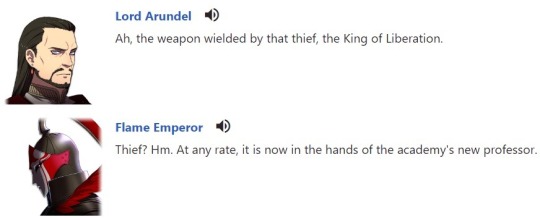
Uhm? How dare Edelgard get confused when Nemesis is described in a way she hasn't ever heard before?
The funny thing is I use this exact quote as a debunk of the common claim that Edelgard got her history of Fodlan from the Agarthans, because if that theory is true, holy shit is Thales ever careless, revealing the truth to her like this.
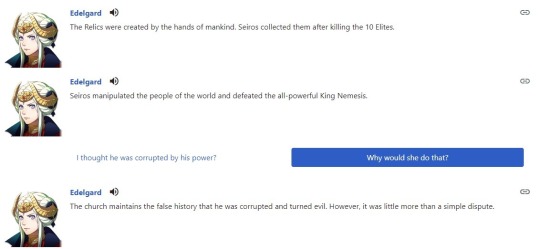
Rhea: (Conceals the truth of what happened between her and Nemesis.)
Edelcrits: How dare Bad Red Lady incorrectly describe what happened between Rhea and Nemesis!

This isn't even her praising Nemesis, it's just her pointing out how both Byleth and Nemesis wielded the Sword of the Creator and stand against the Nabateans, the ones who would distort history, which Rhea and Seteth both worked to do.
"EdeIgard didn't want to kill Rhea! She just wanted her to surrender, Rhea forced her hand!"
Watch, this is gonna be "Edelgard says mean things!" while totally ignoring Edelgard's actions.


Edelgard thinks - and she's proven right - that Rhea would never surrender and accept a peaceful resolution to their conflict.
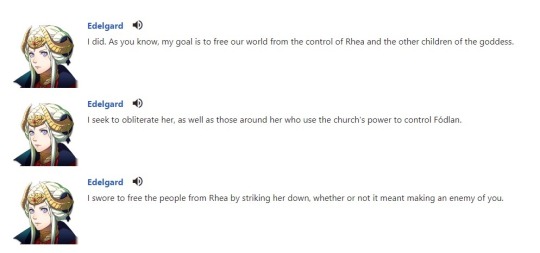
And here we get to mean things. Edelgard's dramatic.

How dare Edelgard be glad that she won and can now begin the long work of reforming Fodlan.
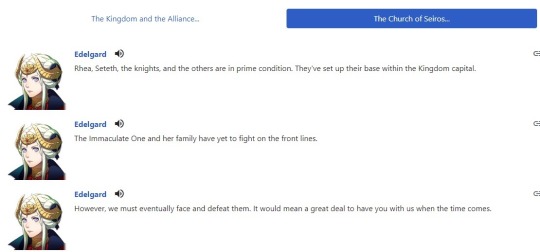
How dare Edelgard acknowledge that she must fight her enemies in battle.
"EdeIgard isn't racist! She just hates Rhea for what she's done!"
Oh this one's totally gonna be mean things.

Humanity, as in, not gods.

Racism is when you want to end a false religion and return freedom to the people.

So here's a funny thing: the localization botched the meaning of this line (shocker).
Here, she's not speaking from her own perspective, she's describing the conflict between Nemesis and Seiros:

(Source)
Also the bit about "masquerading as a human" was a creation of the localization. Thank you, treehouse.
(and featuring our guest star, Hubert!)
Oh Hubert, not you too :(
Who's next, Dorothea? Is she gonna admit to having been in a church choir and not the opera at all!? How deep does it goooooo
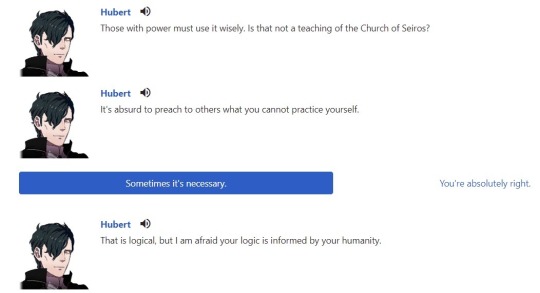

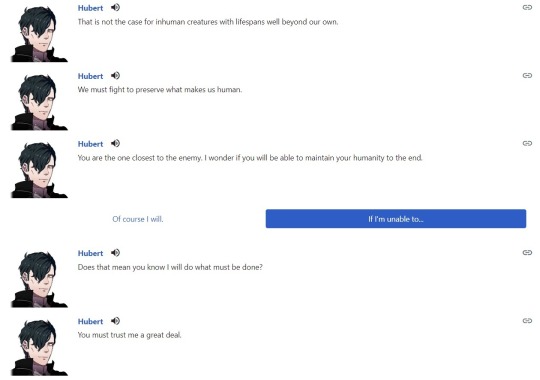
Fuck I don't even know where this is from :I
(Does some digging)
Okay so Treehouse kinda screwed up some of the verbage here. It's not so much that they made it inaccurate as they made it unclear - and Strikes is cutting out context, go fucking figure.
So Hubert's accusing the Church of Seiros of hypocrisy, of saying one thing and doing another. In the original JP, Byleth can reply,
Sometimes you must tell others to do what you yourself can’t do
Or,
You’re right
To the first, Hubert replies,
That is true, Professor. However, that is a principle for humans.
And to the second,
Yes, although humans must sometimes preach things they cannot do…
He then follows with,
It is not a principle for inhuman beings, with lifespans much longer than that of humans. That’s why we chose to fight based on human principles.
From this, he's saying the Nabateans have no excuse for committing the same foibles that humans do because they're immortal beings who should know and do better. This is in keeping with the start of that bit, where he says,
If it is between love and hate, then I would choose the latter. The goddess failed to properly govern this world. That is why it is necessary for Lady Edelgard to become the supreme leader of Fódlan.
Or, to summarize it, his whole argument is, "The gods have failed to be godly, so humanity must take responsibility in their stead."
Which is completely true. Rhea, despite her attachment to the divine, is prone to the same failures as the humans she lives over and should know better than, being a millennia old. She's untrusting, obsessed with reclaiming the past, stubborn, inflexible, and prone to excessive negative reactions to any sign of pushback.
(Source)
I'm glad Strikes brought that up, that was legitimately interesting!
"EdeIgard started her war for the people!"
Oh no, she's not gonna reveal that she did everything for Bellerophon, is she?

This is nearly five years after she began the war, and after the Church of Seiros and the Kingdom have made it plain that a peaceful ending is not in the cards, but okay.

It's like they think we don't understand she intends to bring all of Fodlan under her banner. Yeah, she is, for the sake of reforming all Fodlan and not just the Empire.
"EdeIgard tries to spare everyone she faces!"
Watch we're gonna see Judith! We're gonna see Judith, guys! Strikes loves bringing up Judith!

Mean things again. This one's even worse given Edelgard also expresses a desire not to kill Rhea and tries to offer her a surrender.
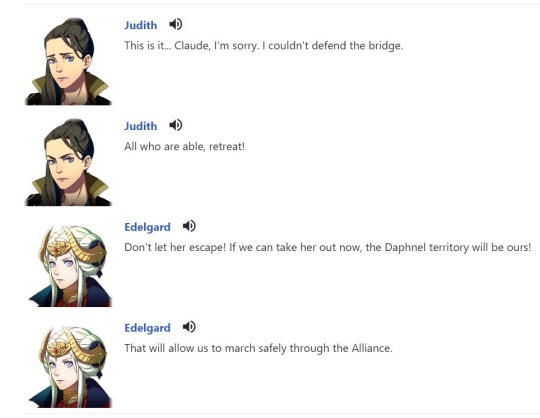
Eeeeeyyyyyy, it's Judith!
We've been over this one. Judith didn't surrender, she was trying to retreat.
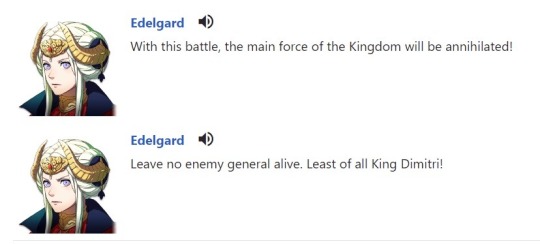
"Won't somebody please think of the generals :("
"The grunts can fuck off though"
Edelgard knows what Faerghus's culture is like, and she knows peace is impossible while Dimitri lives and wants to keep fighting her. Dimitri might be naive enough to think he can just make peace with Edelgard at the end of AM, but she's a little more worldly than him.
"CF is about fighting fate!"
This has kinda already gotten long enough, but it's just a set of points where Edelgard talks about her "fate". Again, Edelgard's dramatic. She also chose this path for herself.
So, in conclusion, you're off the hook this time, Edelgard (and Hubert), but I'll be keeping an eye on you. Don't you betray us now, not after four years :(
#fire emblem three houses#edelgard discourse#edelgard von hresvelg#edelgard positive#butwhatifidothis#hubert von vestra
20 notes
·
View notes
Text
Happy 30th anniversary to The Halloween Tree TV movie!
If you've never seen Ray Bradbury's The Halloween Tree it is really underrated.
The Halloween Tree was a novel written by Ray Bradbury in 1972 after he was disappointed by It's the Great Pumpkin Charlie Brown. He said, and I quote "The Great Pumpkin never showed up."
He originally planned for The Halloween Tree to be an animated Halloween special by animation icon, Chuck Jones, but the plans fell apart so Ray Bradbury published it as a novel instead.
Twenty-one-years-later in 1993 Ray Bradbury finally got his TV special as an animated movie from Hanna-Barbara / Turner / and Warner Brothers. It aired on TBS and for a few years after it was reshown on Cartoon Network.
In the 1990s you could buy The Halloween Tree on VHS tape and it came with a small, cheaply made, copy of the original novel. The video tape also included a Yogi Bear short about Yogi stealing a witch's broom to steal picnic baskets.
The plot of The Halloween Tree was this:
A group of teenagers plan on going trick or treating with their friend Joe Pipkin (Nicknamed Pip). When they arrive at Pip's house they see an ambulance and a note that indicates Pipkin's appendix has ruptured.
At first the kids are very worried about their friend but then they think they see him running through the trees and think he has pulled some elaborate prank on them. They give chase and follow him to a spooky old house with a strange tree in the yard.
The tree is full of thousands upon thousands of Jack-o-lanterns. Each jack-o-lantern represents someone who has died within the year. Here the children meet a mysterious man named Moundshroud (implied to actually be The Grim Reaper).
The children spot their friend hiding and are startled to realize he's a ghost. Before they can adjust to this strange ripple in reality, their ghostly friend climbs up the Halloween Tree and steals the jack-o-lantern representing his own life.
A strange wind comes and carries away their friend so the kids give chase. With the aid of Moundshroud the children travel through time and all over the world to find their friend.
First they go to Ancient Egypt, then medieval UK, then France in the eleven hundreds, and mid-twentieth century Mexico. The children learn the history of Halloween and figure out who Moundshroud actually is.
The children each offer up a year from the end of their lives if their friend can live a full life with them. Moved by their loving offer to try to save their friend, Moundshroud accepts the offer (though this may be how he always intended for it to turn out).
The children hurry back to Pip's house and find him there, tired, but alive and recovering from his appendix surgery.
It's a very sweet story and it's narrated by Ray Bradbury, himself. Leonard Nemoy provided the voice of Moundshroud.
Since the animated version was released on American cable thirty-years-ago and it was not theatrically released, a lot of people outside the US and younger people have never seen it.
It is currently available for rent or purchase on Apple TV, Amazon, and Youtube. And you can buy it on DVD through Amazon.
For a made for TV animated movie it is surprisingly high quality. It won an Emmy. Ray Bradbury, himself, provided narration.
I'm not really sure why it is not aired on TV anymore other than perhaps someone was worried that the cultural depictions might be seen as inaccurate and potentially insensitive. But I watched it pretty recently and it still seems pretty respectful.
I love The Halloween Tree almost as much as I love Over the Garden Wall. Many people consider Over the Garden Wall to be a Halloween special too but in actuality it originally aired in November and was meant to bridge between Halloween and Christmas since it was inspired by early twentieth century Hallowe'en, Thanksgiving, and Christmas postcards.
But both The Halloween Tree and Over the Garden Wall are very underrated.
Here is the opening scene of The Halloween Tree.
https://www.youtube.com/watch?v=Be8vfy2pOcY
youtube
9 notes
·
View notes